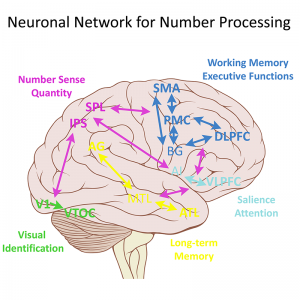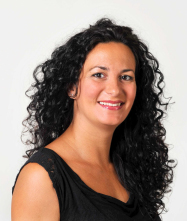We are very pleased to feature a guest post from PD Dr Karin Kucian, associate professor at the Centre for MR Research of the University Children’s Hospital of Zurich. In her article for the Dyscalculia Blog, Dr Kucian explores changes in brain function and brain anatomy and how these relate to developmental dyscalculia.
Evidence is growing that Developmental Dyscalculia (DD) is associated with various alterations in brain function and brain structure. Recent work in the field of DD has used brain-imaging techniques to study the brains of people performing a number of tasks. These techniques have allowed researchers to generate high-resolution images of participants’ brains, making it possible to observe brain activation patterns during number processing.

Kucian, K. (2016). Developmental Dyscalculia and the Brain. In D. B. Berch, D. Geary, & K. Mann Koepke (Eds.), Development of mathematical cognition: Neural substrates and genetic influences (Vol. 2, pp. 165-193). Amsterdam: Elsevier.
The last few years have given us a clearer picture of what happens in our brains during number processing and calculation. Brain imaging reveals that these operations require an entire neuronal network to carry out. Within this network, an area of the brain called the intraparietal sulcus (IPS) is the centre for numerical processing. You can see the area marked on the illustration.
During research studies, the IPS activated whenever subjects had to deal with numerical magnitude. This included not just math tasks but even situations such as simply looking at changing amounts of dots.
Numerical processing also involves memory, as well as attentional, perceptual, motor, and spatial functions.
Add to this that the prefrontal cortex in general is associated with cognitive processes involved in calculation tasks and we start to get an idea of just how complex is number processing.
Altered brain function in dyscalculia and hope for remediation
Research findings conclude that brain activation pattern during number tasks is less precise in children with DD (developmental dyscalculia). These children may also exhibit deficits in core brain regions used for number processing. To make up for this, dyscalculic children may rely more heavily on supporting brain areas associated with memory, attention, or finger counting. It’s not that dyscalculics use other brain regions to calculate. Rather they need to recruit other regions to make up for reduced activation in areas generally associated with numerical processing.
There is an urgent need to transform this basic knowledge into evidence-based, practical applications for special needs education and remediation. First steps in this direction have already been taken and provide promising results for affected children. Our brain is a highly plastic organ and adapts constantly—not only to typical development but also to special stimulation such as remediation.
What were some of the results when children with dyscalculia completed a specific intervention? Brain imaging depicted a decrease in activation for those supporting areas we talked about. Furthermore, increased activity was observed in areas such as the IPS (see the illustration above) that are pivotal for number processing.
Brain anatomical changes in developmental dyscalculia
There is a growing body of knowledge showing DD is not only associated with alterations in brain activation, but also with changes in brain anatomy. Simply put, our brain can be divided into grey and white matter. Grey matter includes the outer layer of our brain with all the neuronal cell bodies and white matter is the inner part with the axons of the neurons.

Photo by Joshua Hoehne on Unsplash
When it comes to grey matter, a reduced volume in areas that are thought to play a key role in numerical abilities characterises DD. Basic number processing and calculation depend on a complicated network that includes different and widespread brain areas. In dyscalculics, anatomical alteration in gray matter has been reported across almost the entire network.
These brain regions are linked and communicate by complicated connections among different cortical and subcortical regions. Fast and accurate connections between the different brain regions are crucial for efficient transfer and adjustment of information.
There is still little known about impairments of brain connections and how these relate to DD. But the evidence to date supports the hypothesis that developmental dyscalculia is associated with a disconnection or reduced connection between brain areas important for number processing. Affected brain regions appear to vary, which could be explained by the diverse nature of dyscalculia.
Key takeaways:
- Number processing and calculation are highly demanding cognitive skills
- Number skills require a complicated neuronal network
- Deficits in brain function, brain structure, or brain area interconnections have been reported across almost the entire neuronal network of people with dyscalculia
- Brain activation pattern in children with DD is less precise than in those without dyscalculia
- Brain areas affected in dyscalculics are mainly the parietal areas, but other cortical and subcortical regions can also be affected
- The stronger recruitment of supporting areas associated with working memory, attention, monitoring, updating, or finger representation are supposed to reflect compensatory mechanisms in dyscalculic children
- The use of supporting areas for number tasks could also reflect deficits in these domain-general skills that might contribute to the development of DD
- Intervention and remediation for dyscalculic children can improve brain activation in areas associated with number processing
- There is an urgent need to take research findings and apply these towards practical special education resources for dyscalculia
About the author

Karin Kucian studied Neurobiology and Educational Science at the Swiss Federal Institute of Technology. After her PhD on the development of cerebral representations of numbers in typically achieving children and children with developmental dyscalculia, she focused further on the investigation of neuronal correlates of number processing in children with developmental dyscalculia and interventions to improve numerical understanding. In 2015, she obtained the venia legendi of the medical faculty of medicine of the University of Zurich and is now working as an associate professor at the Centre for MR-Research of the University Children’s Hospital Zurich.
Great article. Is there any recourse for a mother who notices signs like dyscalculia but also slow processing and poor memory in her 7 yr old child? The school declined further testing for her, siting they’ve exhausted all evaluations even though they have only tested her in: motor, speech, social development. She is doing kindergarten level work (if that)even though we spend hrs of studying.I have been in a waiting list from her Dr. for 4, (now 2 yrs)to see a neurologist., and she also needs to see a psychologist. Are these the correct Drs. she should be seeing? What help is there really?
The school system is failing in evaluating /accommodating children with severe disabilities but help children with minor issues.Research proves that these mental disabilities hinder,and individuals end up homeless.As kids age there is less sympathy for the unskilled /slow processing.I want my daughter to get help not just be labeled. Teachers secretly recommend,”a Dr. needs to put her in drugs.”What breakthroughs show a promise in having these individuals live decently/integrated in society?
I applaud all those with doctrines/PhD’s but I found out if they find out she has something it will more than likely be used only to accommodate her in school.Advances in knowledge isn’t equaling to advances in quality of life or help. Meanwhile I keep practicing academics hoping her long term memory takes in what it will -through exposure.Are there any frank articles on the injustices and real challenges individuals and families face that are struggling with issues such as dycaldia?
Any Dr. out there care to help?-respectfully yours
Hi Petra,
Thank you for your questions 🙂
I can say that those are the doctors she should be seeing, I am surprised however at how long you have been waiting to see a neurologist that must be incredibly frustrating. As for the psychologist, it should be an educational psychologist that she goes too and getting an evaluation done is most important as the educational psychologist should be able to tell you what specific support your daughter needs to help her. There is research out there that does support peoples abilities to overcome some of the difficulties they have with dyscalculia, but this depends on the severity of dyscalculia in the individual. Unfortunately, it will always be there and always something your daughter will have frustrations with to some extent, as it is not curable. But in saying that many people live great happy and meaningful lives with dyscalculia such as many of the individuals in our Dyscalculia Support Group on Facebook, which people share tips on how they handle their dyscalculia (everyone is different!). This group would be a great place for you or your daughter to find more resources also you will find doctors and educational psychologists here 🙂 As you have been waiting so long (and maybe waiting longer) for a diagnosis/evaluation on what specific support your daughter needs I would recommend trying Calcularis as it adapts to your daughters’ needs, making sure she gets the support where its needed and is specifically designed for dyscalculia. I hope this all helps and let me know if you have any further questions. 🙂
HI i am 54 year old female,I tried college seven times.The last time i tried i got tested and told everything was so much harder for me and that i had dxslexia/adhd.I got some accomadations in college but.but it was too exhauting for me. i havent found any support groups and im not even sure i was diagnosed correctly .My disability affects me in all areas of my life,i dont seem to be able to be organized o my own,in thoughts,schedules,speach,My emotions get so tangled.It affects me at work .My auditotry memory is also bad .I have to write things down and they get lost.Sequencing is extrememly difficult.I live in delaware where can i can help and tested for what i really have.I almost feel like applying for disability because im struggling so much
Hi Susan,
I would recommend joining the Dyscalculia Support Group on Facebook – if you can 🙂 There are lots of people in here that can help.
I took a quick look into it and found The New Heights Center LLC and thought they may be able to help too.